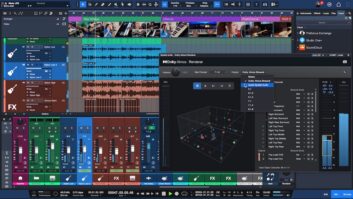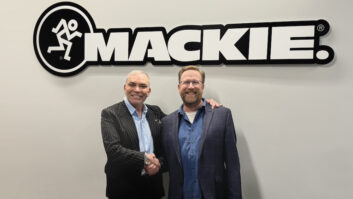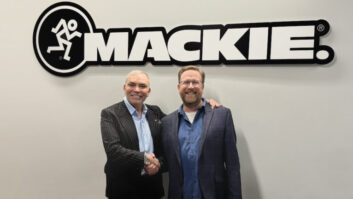By Clive Young.

Word has been circulating for a little while, and we at Pro Sound News have covered it too: Mackie’s upcoming Onyx-i Series analog consoles will reportedly be able to connect directly to computers running M-Powered Pro Tools without any Avid-developed hardware. Mackie stealthily spread the news through secret Fed Ex packages, complete with ransom notes and such, playing up a ‘bad-boy’ image (and after all, in the movies, bad guys wear black–or “Onyx” if you prefer).
As reported here on ProSoundNews.com, Avid stated that it “has not approved or tested Mackie equipment to be interoperable with any of its solutions,” which would seem to indicate this isn’t mere hype-inducing play-acting on Mackie’s part. It’s safe to presume Mackie has carefully documented its reverse-engineering effort in order to have some insurance if lawsuits start flying, but what would it really take for Avid to stop this work-around? Likely some quick coding to be released as a “security update” in the not-so-distant future.
If that sounds like a familiar scenario, it’s happened before, most visibly in recent times with Apple’s iPhone. While it is one of the cell phone’s major selling points today (not to mention a massive profit engine), originally there was no App Store for the iPhone. You bought the phone with a handful of Apple-written/approved/installed apps on board, and that was it. And that was not enough for some folks.
Within months of the original iPhone’s release in 2007, enterprising users started “jailbreaking” their handsets, hacking them with a combination of homebrewed code and irreversible hardware mods, in order to install unsanctioned applications. Apple’s response was to simply alter its coding so the hacks didn’t work; suddenly that $495 cell phone was a very shiny, expensive paperweight.
Since then, a game of cat-and-mouse has gone on, with Apple making changes and hackers sooner or later defeating the company’s latest efforts–and it’s easy to imagine something like that arising from this Mackie/Avid situation. But Apple also made a secondary move in 2008: It opened the doors to the iPhone with its Software Developers Kit, paving the way for the App Store. Since then, over 50,000 apps have been created, which in turn have led to more than a billion downloads. While Apple is still fighting iPhone hackers through legal means, it’s really the App Store that has staved off jailbreaking–by rendering it unnecessary for most users.
While that’s how Apple handled a similar situation, it remains to be seen how–or even if–Avid will respond to the challenge thrown up by the Onyx series. Will Mackie’s move nudge Avid to license out approved Pro Tools drivers? Might Avid answer back with its own mixers released around the same price-points as the Onyx series? Or perhaps is there something else up the proverbial Pro Tools sleeve? Regardless of all the hypotheticals, it will be fascinating to see how this plays out.
What do you think is Avid’s next move? How about Mackie’s?Share your thoughts in the comments below!







